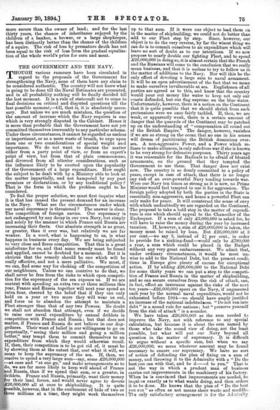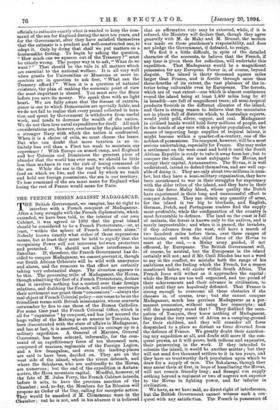114 N GOVERNMENT AND THE NAVY. T HOUGH various rumours have
been circulated in regard to the proposals of the Government for strengthening the Navy, none of them have any claim to be considered authentic. The country will not know what is going to be done till the Naval Estimates are presented, and in all probability nothing will be finally decided till the last moment. It is a rule of statecraft not to come to final decisions on critical and disputed questions till the last possible moment,—till, that is, it is absolutely neces- sary. But unless we are much mistaken, the question of the amount of increase which the Navy requires is one which is very strongly disputed in the Cabinet. Hence it is more than probable that the Government have not yet committed themselves irrevocably to any particular scheme. Under these circumstances, it cannot be regarded as useless or impertinent, or as a mere waste of breath, to urge upon them one or two considerations of special weight and importance. We do not want to discuss the matter either from a party point of view, or from an expert's point of view, but from that of plain commonsense, and divorced from all ulterior considerations, such as the influence likely to be exerted upon the popularity of the Government of a large expenditure. How ought the subject to be dealt with by a Ministry able to look at the matter impartially, and not hampered by any past promises or declarations, or by any traditional policy ? That is the form in which the problem ought to be considered.
To find the proper solution, we must first inquire what it is that has caused the present demand for an increase in the Navy. What are the circumstances under which our naval supremacy is threatened ? The answer is clear. The competition of foreign navies. Our supremacy is not endangered by any decay in our own Navy, but simply and solely by the manner in which France end Russia are increasing their fleets. Our absolute strength is as great, or greater, than it ever was, but relatively we are far weaker. In a word, what is happening to us, is what happens in business every day. We are being subjected to very close and fierce competition. That this is a great misfortune for us, and that some remedy must be found and applied, cannot be doubted for a moment. But it is obvious that the remedy should be one which will be really effective, and not a mere palliative. We must, if we can, find some way for choking off the competition of our neighbours. Unless we can contrive to do that, we shall never be free from the risks to which open competi- tion for the supremacy of the sea, exposes us. If we are content with spending an extra two or three millions this year, France and Russia together will next year spend an extra four, cheered by the belief that if they can only hold on a year or two more they will wear us out, and force us to abandon the attempt to maintain a Fleet stronger than that of any two Powers. No doubt we shall not abandon that attempt, even if we decide to raise our naval expenditure by annual driblets in competition with France and Russia ; but that does not matter, if France and Russia do not believe in our dog- gedness. Their want of belief in our willingness to go on perpetually, "seeing their million and going a million 'better," may tempt them to commit themselves to an expenditure from which they would otherwise recoil. If, then,. their competition is to be got rid of, it must be by showing them at the outset that, cost what it will, we mean to keep the supremacy of the sea. If, then, we resolve to spend a very large sum--say, some £26,000,000 —at once and "at one go," and. make arrangements so to do, we are far more likely to keep well ahead of France nd Russia, than if we spend that sum, or a greater, in riblets. France and Russia, primarily, want their money or their land forces, and would never agree to devote 26,000,000 all at once to shipbuilding. It is quite ible, however, that in the excitement of bids of two or ee millions at a time, they might work themselves up to that sum. If it were our object to lead, them on in the matter of shipbuilding, we could not do better than add to our Fleet step by step. Since, however, our object is to do the very reverse, by far the wisest thing we can do is to commit ourselves to an expenditure which will leave no sort of doubt as to our intentions. If we now propose to nearly double our fighting Fleet, and to spend £26,000,000 in doing so, it is almost certain that the French and the Russians will come to the conclusion that we really mean business, and that it is useless to try to follow us in the matter of additions to the Navy. Nor will this be the only effect of devoting a large sum to naval armament. It will be an open advertisement of the fact that we mean to make ourselves invulnerable at sea. Englishmen of all parties are agreed as to this, and know that the country would pour out money like water to keep not only our coasts defended, but our flag supreme on the blue water. Unfortunately, however, there is a notion on the Continent that it is quite possible that we should shrink from such pretensions were we once fairly tackled. If, then, we are weak, or apparently weak, there is a certain amount of danger that the quarrels of the Continent may be patched up on the understanding of "compensation all round out of the British Empire." The danger, however, vanishes if we are so strong on the ocean that no one in his senses will dream of partitioning the British dominions over- sea. A non-aggressive Power, and a Power which re- fuses to make alliances only safe from war if she is known to be very strong for de is purposes. Thirty years ago it was reasonable for the Radicals to be afraid of bloated armaments, on the ground that they tempted the Government to use them. That danger does not exist now. The country is so firmly committed to a policy of peace, except in case of attack, that there is no longer any risk of an over-powerful Navy tending towards war. Were our Navy ten times as strong as it is now, no Prime Minister would feel tempted to use it for aggression.. The foreign policy adopted by both the parties in the State is essentially non-aggressive, and hence a powerful Fleet can only make for peace. It will counteract the sense of envy with which undoubtedly we are regarded on the Continent_ The proposal to take a bold step in the matter of expendi- ture is one which should appeal to the Chancellor of the Exchequer. If a sum of only £3,000,000 is asked for, he will have to raise the money during the year by increased taxation. If, however, a sum of £26,000,000 is taken, the money must be raised by loan. But £26,000,000 at 3 per cent.—we say 3, instead of 2f per cent., in order to provide for a sinking-fund—would only be £780,000 a year, a sum which could be placed in the Budget without any very great embarrassment. We admit that, under ordinary circumstances, it would be most un- wise to add to the National Debt, but the present condi- tions in Europe give plenty of excuse for exceptional action. If by adding £26,000,000 to the National Debt for some thirty years we can put a stop to the competi- tion of France and Russia in the matter of shipbuilding, and so can secure ourselves from the risk of attack, can, in fact, effect an insurance against the risks of the next ten years—£26,000,000 spent on the Navy, if augmented each year by the normal naval expenditure, would not be exhausted before 1904--we should have amply justified an increase of the national indebtedness. "Do not run into debt" is a sound rule for nations' but "preserve yourself from the risk of attack" is a sounder.
We have taken £26,000,000 as the sum needed to improve the Navy, not with reference to any special calculation, but because it is about the sum, named by those who take the sound view of doing, not the least possible, but what will put our Navy beyond all question in the matter of supremacy. It is difficult to argue without a specific sum, but when we say £26,000,000, we mean whatever amount may be found necessary to ensure our supremacy. We have no sort of notion of defending the plan of fixing on a, sum of money, and throwing it to the Admiralty with a "Do the best you can with that, and be d—d. to you." That is not the way in which a prudent man of business carries out improvements in the machinery of his factory. When he is convinced, that improvements are needed, he inquires exactly as to what wants doing, and then orders it to be done. He knows that the plan of "Do the best you " as often as not means sheer, waste and middle-. e only satisfactory arrangement is for the Ad,aiiralty officials to estimate exactly what is wanted to keep the com- mand. of the sea for England during the next ten years, and for the Government, after they have satisfied themselves that the estimate is a prudent and well-constructed one, to adopt it. Only by doing that shall we put matters on a businesslike footing. To begin by asking the question, "How much can we squeeze out of the Treasury ?" must be utterly wrong. The proper way is to ask, "What do we want ?" That should be the rule in all matters which are essential to the national welfare. It is all very well when grants for Universities or Museums or more in- spectors are in question to ask first, "What can the Treasury afford ? " When it is a question of national existence, the plan of making the economic point of view the most important is absurd. You must save the State before you save its money. We speak thus with no light heart. We are fully aware that the disease of extrava- gance is one to which Democracies are specially liable, and we do not fail to realise that every pound collected in taxa- tion and spent by Government is withdrawn from useful work, and tends to decrease the wealth of the nation. We do not then love naval expenditure for itself. All such considerations are, however, overborne by the plain need for a stronger Navy with which the nation is confronted. When it is a choice of evils, we must choose the lesser. But who can doubt that more taxation is an in- finitely less evil than a Fleet too weak to maintain our supremacy ? With Europe an armed camp, and England and her Colonies and Dominions the greatest piece of plunder that the world has ever seen, we should be little less than madmen to run the risk of losing command of the sea. While the sea is the road by which comes the food on which we live, and the road by which we reach and hold our foreign possessions, the sea is our territory. To lose command of the sea must mean for England what losing the rest of France would mean for Paris.



































 Previous page
Previous page